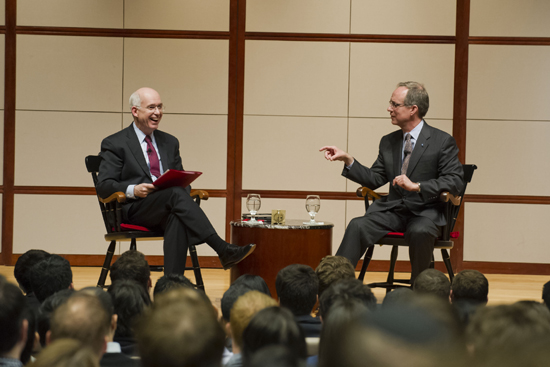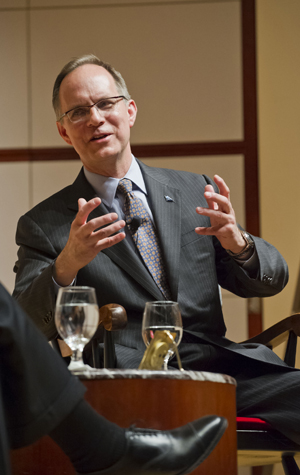JetBlue CEO Talks Airlines, Aspirations
Tells SMG students: “Don’t take the first job that comes along”

SMG Dean Kenneth Freeman (left) and JetBlue president and CEO David Barger chatted last week about career paths, leadership, and the future of airlines. Photos by Kalman Zabarsky
David Barger, JetBlue president and CEO, liberally mixed humor and candor throughout an hour-long discussion last week at the School of Management about JetBlue’s success in an airline industry replete with bankruptcy, mergers, and acquisitions.
Barger was greeted by a standing-room-only crowd for the SMG Dean’s Speaker Series, where he and Kenneth Freeman, SMG’s Allen Questrom Professor and Dean, discussed Barger’s career path, his leadership style, and the future of airlines. Students were invited to ask questions during the second half of the session, and two lucky participants earned a pair of free tickets.
In a nod to the packed room, Freeman remarked, “We have full capacity utilization, which is great in the airline industry.”
Barger, who helped found JetBlue 14 years ago, was the latest guest in the speaker series, which has brought to campus industry stars like Adam Bryant, New York Times senior editor for features, Ed Weiss, general counsel of the Boston Red Sox and Fenway Sports Group, and Dannon CEO Gustavo Valle.
Barger’s father was a pilot with United Airlines, and he grew up in the airline industry. But with less than 20/20 vision, flying was not an option. Instead, he took a job in Detroit as a $5.50-an-hour customer service agent with New York Air. “I think it was one of the best things that happened to me,” he said. “It allowed me to really end up working on the ground and making my way up through the leadership ranks.”
Barger earned his first general manager position in New Orleans and stayed with New York Air from 1982 through 1988. He then hopped to Continental Airlines, where he served in various management positions, including as regional director in Guam and then as vice president of the company’s Newark hub. “There’s just so much opportunity if you don’t tie yourself to one geographic location, especially in this business,” he said.
In 1998, Barger teamed with David Neeleman to found JetBlue, a scrappy start-up in a world of airline giants. “Don’t be afraid to get involved in something that’s entrepreneurial,” he advised students. “You can always come back in terms of a traditional airline. If you have the opportunity to create something new as opposed to just implementing somebody else’s vision, that’s an awful lot of fun.”

The company is now the fifth largest airline in the country, with 15,000 crew members and service to 80 destinations (including Worcester, Mass., as of November 7, the company announced last week) in 14 countries, with 30 percent of its travel to the Caribbean and Latin America.
But flying JetBlue hasn’t been all blue skies. Barger was the airline’s chief operating officer when a winter storm struck in February 2007, stranding hundreds of passengers on the tarmac for up to 11 hours in some places. The event threw the company into turmoil, lifted Barger to the rank of CEO, and taught everyone in the industry some valuable lessons. One, he said, was simple: “Mother Nature, she’s going to win. So let her win.” Another was for the company to cool its jets, so to speak, and grow at a more measured pace.
The open secret to JetBlue’s success isn’t strong financials or having the best seats or airfares—although the company has them, Barger said. “At the end of the day, that can all be replicated,” he said. “It does come down to the human equation. It’s our frontline crew members who are making the difference.”
JetBlue employees are not unionized, and Barger is proud of that. “I just don’t think you have to pay somebody to speak for you in terms of how we’re building our culture,” he said. “We want the loyalty to the company as opposed to the third party.”
Barger said loyalty grows when employees respect, and connect with, their leader. For that reason, he takes care to attend new hire orientations, travel frequently, keep active on Twitter, and support socially responsible actions, like the company’s effort to plant one million trees along New York’s Queens-Brooklyn border.
Good managers should ask themselves one question, Barger said: “Would you like to report to yourself when you look in the mirror?” If the answer is yes, then they’re on the right path. And when a challenge arises, he added, “tackle it. Don’t try to put it underground.”
When Freeman opened the discussion to students, some wanted to know about the industry’s future (expect better in-flight entertainment, faster check-in, and satellite-based cockpit navigation), his day-to-day life (“Do you want people to leave the room now?”), and his most beneficial college experience (his political science courses at the University of Michigan).
But on the tip of everyone’s tongue was: what advice does Barger have for job seekers?
“Don’t take the first thing that comes along,” he said. “Look for places that stretch you, if you want to be stretched. Make sure that they stretch you.”
To view an edited version of David Barger’s conversation with SMG Dean Kenneth Freeman click here.
Comments & Discussion
Boston University moderates comments to facilitate an informed, substantive, civil conversation. Abusive, profane, self-promotional, misleading, incoherent or off-topic comments will be rejected. Moderators are staffed during regular business hours (EST) and can only accept comments written in English. Statistics or facts must include a citation or a link to the citation.